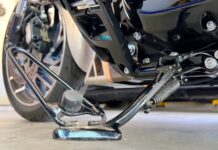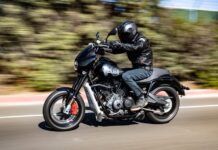It’s not knowing who Harvey Mushman is that makes you cool; it’s caring who Harvey Mushman is that makes you cool. In 1971, Mushman finished 10th overall in the Elsinore Grand Prix, 250 Expert Class. Mushman’s name comes up from time to time, and it’s kind of hard to say why. He was also an International Six Days Trial rider in 1964 representing the U.S.A., and a race car driver. He died in 1980 in Mexico at the age of 50.
Mushman was often affiliated with the greats of his day—greats who would go on to become legends. Legends like Bud Ekins and Kenny Howard, a.k.a. Von Dutch—you know, the flying eyeball? Yeah, that cool. Mushman’s bikes are always a draw at auctions and shows and often incorporate brush work by Von Dutch.
It‘s been over 40 years since Mushman appeared in the Bruce Brown classic On Any Sunday and you should know by now that Harvey Mushman is really the late Steve McQueen. Harvey Mushman was reportedly the alias used by McQueen to enter races. Movie industry executives were unhappy with McQueen’s risky racing habits and wanted it to stop. McQueen didn’t want it to stop. Enter the alias: Harvey Mushman.
I’m too young for McQueen or the times he lived in to have had their full impact on me, but the impact they did make has been a lasting one. This was evident last October when I was noshing with other motojournalist types and the discussion somehow turned to McQueen. We were bugged because we couldn’t remember his racing alias, Harvey Mushman. How cool do you have to be to have people pondering your racing alias more than 30 years after you’ve died?
Eventually, someone in the group enthused, “Harvey Mushman!” No smart phones, no cheating, just genuine middle-aged brain cells, sorting at full song. We agreed in unison, Harvey Mushman. Moments like that are always cool, but at the same time, a little dweeby. But considering the company I was keeping at the time, if that makes me a dweeb, I’m OK with that too.
McQueen is probably the reason I had to own a ’73 Elsinore, at least for a while, and why I’ve always loved fastback Mustangs just like the one he flew through San Francisco in Bullitt. The Towering Inferno, one of his biggest hits, was also set in San Francisco, an undeniably cool place in the late ’60s and early ’70s, and even today for that matter. He was probably the biggest shill Rolex ever had, making the Rolex Submariner popular to this day.
His movie LeMans in 1971 was something of a letdown to me. I remember collecting movie posters from the neighborhood Gulf gas station as a kid. Gulf was the sponsor of the Porsches driven in the movie and at the actual race and gas stations would give a kid anything back then.
I saw LeMans at the local drive-in, the Sky High, I think. I was too young to drive so my dad took me. I fell asleep, and I’m pretty sure my dad did too. That’s not so cool, but the idea that McQueen was making movies about racing back then was cool. Before Nascar was on television, probably even before the Indy 500 was live on TV, McQueen was making a movie about endurance racing.
McQueen and his cohorts were “where it was at” back then, and by default are still very cool today. Sheryl Crowe thought he was cool enough to write a song about him in ’02 titled “Steve McQueen.” It’s hard to get any cooler than Sheryl Crowe singing about you in a pair of leather pants. She’ll probably never write a song titled “Ernie Copper.”
As cool as McQueen is, there are at least two acts of coolness often falsely attributed to him. First, he did not perform the motorcycle jump in the 1963 movie The Great Escape. That was Bud Ekins. And second, the character in the Disney-Pixar film Cars is not named after him; it’s named after the late Glenn McQueen, the animator extraordinaire who worked for Pixar. These are basic McQueen trivia items that you need to know.
Sometime this month dust off your copy of On Any Sunday and pop it in, then hoist one to ol’ Harvey. March 24 would be his birthday and I’m sure he’d be glad to know we still remember him.



















